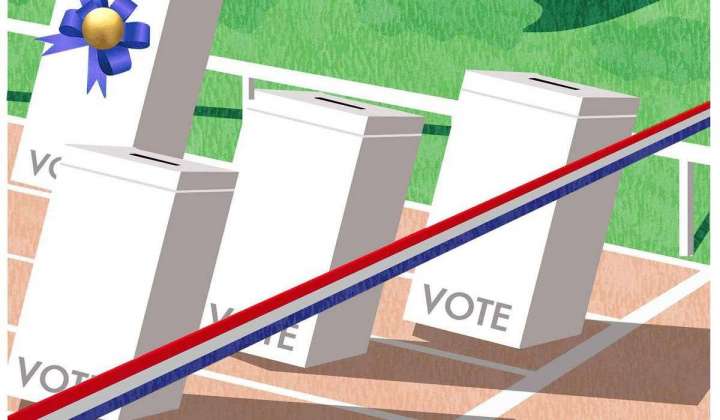Dear states: Don’t give in to liberal election demand of ranked choice voting

OPINION:
The wrong winner. Recounts of every race. Soaring distrust in election outcomes.
These things are happening right now in California, and liberal activists want every state to adopt the disastrous system that created this mess. It’s called “ranked choice voting,” and two dozen or more states may consider it this year. If that happens, the way millions of Americans vote would fundamentally change for the worse, undermining our democracy to an unprecedented extent.
Ranked choice voting — which New York City already has in some local elections and states like Alaska and Maine have implemented to varying degrees — is a profound departure from the tried-and-true process voters know. In every normal election, people vote for the candidate they prefer, and the candidate with the most votes wins. But in ranked choice voting, you don’t just vote for one person. You’re supposed to list every candidate on the ballot in order of preference — whether there are three candidates, or 33.
These rankings kick in if no candidate gets more than 50% of the vote — a frequent occurrence, from presidential elections to school board races. At that point, the least-popular candidate is disqualified, so anyone who ranked them first has their vote shifted to their second-ranked candidate. The process repeats until someone gets a majority of the remaining votes.
Liberals’ supposed justification of this bizarre system is that it leads to less extremism. Still, as California cities are finding out, the real result is more confusion and distrust in elections.
Look no further than Alameda County, in the San Francisco Bay Area. Nearly two months after a November school board election that used ranked choice voting, the county announced that oops, it had named the wrong winner. A software error meant that the third-place candidate actually came in first. Now the county is conducting a recount of every single election that used this confusing and error-prone system.
This is far from the only problem with ranked choice voting. Equally concerning: It regularly leads to situations where candidates who lose in the first round still win.
Take Maine, which passed this system in 2016. In the 2018 race for the 2nd Congressional District, Republican Bruce Poliquin got 46.33% of the vote, only to lose to Democrat Jared Golden, who got 45.58%. In 2021, in a 10-person race for four open seats on the Portland Charter Commission, two of the top four initial vote-getters ultimately lost. One of the eventual winners started with a mere 4% of the vote. It’s hard not to feel cheated when losers ultimately win, and that feeling doesn’t bode well for the health of our democracy.
What’s more, ranked choice voting overturns the bedrock democratic principle of “one person, one vote.” In the 2018 Maine race, Mr. Golden won in large part because more than 8,000 ballots were thrown in the trash. Why? Because some voters didn’t rank every candidate. In the second round, any voter who didn’t list a third-choice candidate or either of the final two candidates in their top two no longer had a say in the election.
Similarly, in Alaska’s August 2022 special election for its at-large congressional seat, 15,000 votes were discarded, while 17,000 were thrown out in the November race. And in one San Francisco local election, more than half of the ballots were disqualified by the final round of recounts. It’s profoundly undemocratic to throw away someone’s vote because they didn’t vote for someone they may dislike.
Finally, ranked choice voting delays election outcomes, which sows distrust. Activists claim it provides an “instant runoff,” but the system of a recount after the recount is interminably long. The result of Alaska’s special election last year wasn’t known for a staggering 15 days. Accusations flew and confusion reigned at that time, and the state lacked representation in the House of Representatives. If the last few years have proved anything, it’s that the longer it takes to count votes, the less voters trust the system — and the more chance there is for fraud or error, as California is finding out the hard way.
Each of these electoral issues — losers winning, valid votes being trashed, and delays in outcomes — is problematic on its own. Yet ranked choice voting combines them all, creating a voting system that is all but guaranteed to weaken the very democracy it purports to strengthen. Liberal activists are pushing more cities and states to adopt this failed system in 2023. The better bet is to stick with the truly democratic voting system that we already have — and can actually trust.
• Tarren Bragdon is CEO of the Foundation for Government Accountability, where Madeline Malisa is a senior fellow.






